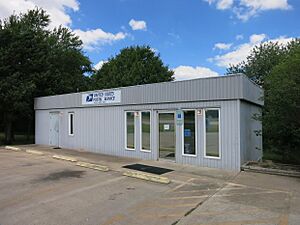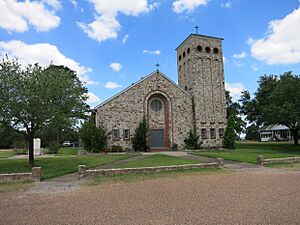Plum, Texas facts for kids
Quick facts for kids
Plum, Texas
|
|
|---|---|
| Country | United States |
| State | Texas |
| County | Fayette |
| Elevation | 299 ft (91 m) |
| Time zone | UTC-6 (Central (CST)) |
| • Summer (DST) | UTC-5 (CDT) |
| ZIP code |
78952
|
| Area code(s) | 979 |
| GNIS feature ID | 1365467 |
Plum is a small, unincorporated community in Fayette County, Texas, United States. This means it's a place where people live, but it doesn't have its own city government like a town or city. Plum has a post office, and its special mail code is 78952.
Contents
Where is Plum?
Plum is located in Texas, about eight miles west of a town called La Grange. It sits right along State Highway 71. A railroad line, the Missouri, Kansas and Texas Railroad, also runs through the area. The land around Plum is mostly open prairie and has many postoak trees.
How Many People Live in Plum?
In 2020, about 366 people lived in Plum. This number helps us understand how big the community is.
Plum's History
Plum was first settled by families from Tennessee. They arrived in the area in the late 1820s and early 1830s. The community was first called Plum Grove. It is the second oldest community in Fayette County.
Early Community Life
The Hopewell Baptist Church, now known as Plum Baptist Church, was very important. It was the first Baptist church west of the Colorado River in Texas. It was also the first in Texas to hold an ordination service and perform baptisms.
Plum Grove Rifles
During the American Civil War, a group called the Plum Grove Rifles was formed on July 8, 1861. Captain Thomas C. Moore led this unit. It seems they were mainly for training. Members later joined other regular army units.
Growth and Changes
In 1880, Plum got its own post office. By 1900, the community had grown quite a bit. It had two churches, two stores, two places to process cotton (cotton gins), two blacksmith shops, a saloon, and a doctor.
By 1950, the population was estimated to be 280 people. There were also seven businesses in the area. However, by the 1980s, the population dropped to 95 people. Only two businesses remained, but the post office stayed open.
Oil Discovery
In the late 1970s and early 1980s, oil was discovered nearby. This oil was found in a rock layer called the Austin Chalk formation. This discovery helped to boost the local economy for a while. The population remained around 95 people through the year 2000.
Images for kids





